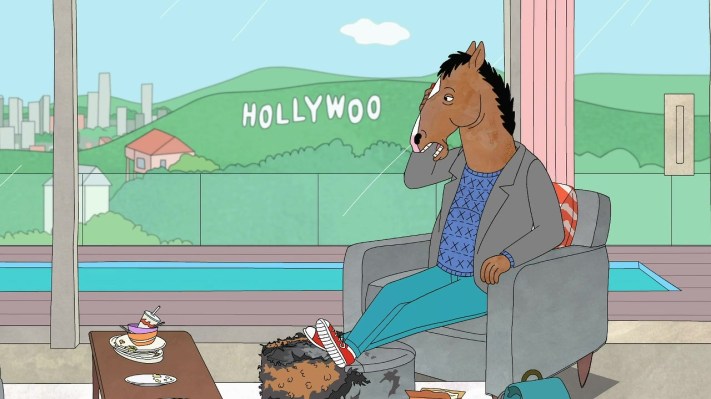Did you watch the Oscars? Did you care about the Oscars? Statistically, if you’re American, you cared 25% less than 10-15 years ago. US movie theaters sold 5.5 tickets per capita to the American public in 2002, a number which has since declined to 4.1 in 2016. The overall box office looks healthy, thanks to ticket price inflation, but behind the headline numbers, Hollywood is not what was.
Of course this doesn’t mean it’s doomed; but it’s now a truism, or even an understatement, to say that the movie and television industry has been — and will be further — irrevocably transformed by technology, right down to the fundamental business models. An excellent way to track this transformation is to follow the estimable Matthew Ball, Head of Strategy at Amazon Studios, who has a real knack for tweeting out eye-opening charts such as:
https://twitter.com/ballmatthew/status/824463109196701697
and
https://twitter.com/ballmatthew/status/819021603094700032
and
https://twitter.com/ballmatthew/status/836011414472941568
The Economist, echoing Ball, published a recent special report about the entertainment industry, headed “Winner takes all.” Put briefly: so much for Chris Anderson’s infamous Long Tail theory, which is deader than a dodo. Instead,
Technology is making the rich richer, skewing people’s consumption of entertainment towards the biggest hits and the most powerful platforms […] Paradoxically, enabling every individual and product on the planet to find a market has made it next to impossible for the market to find them […] It seems clear now that the future of mass entertainment is not “selling less of more”, as Mr Anderson put it, but selling a lot more of less […] whatever the arena, the biggest crowds will increasingly gravitate towards just a small number of the most popular hits.
The numbers are remarkable. Disney made last year’s five biggest box-office hits, and pulled in 20% of all worldwide film revenue last year with a mere 14 films. There is so much scripted television out there that if you sat at home and watched a new series, in its entirety, every day of the year, you would still miss out on roughly 100 shows.
And of course this applies to books and music, too. The book industry has lamented the “death of the midlist” for many years (which, as something of a midlist novelist myself, I watched with vaguely bitter fascination…) during which it too became a winner-takes-all hit-driven industry. Spotify reported in 2014 that 20% of the songs in its catalog had never been played, ever, by anyone. If a long tail falls in a forest, and nobody hears it…
All that without even getting into such factors as the rise of e-sports
and the simultaneous decline of televised sports
and, of course, the smartphone revolution that has completely upended decades of screen habits
…but let’s not get into all that right now. Let’s just talk about the increasingly winner-take-all nature of the entertainment biz. Does that remind you of anything? 90% of attempts are failures, but a few are such megahits that they justify the entire industry, everyone’s full of hot air and bluster, and doesn’t dare offend anyone because you never know who might craft the next megahit … oh, that’s right! It’s just like Silicon Valley.
The similarities really are striking. VCs ←→ studios. CEOs ←→ directors. Board members ←→ producers. A general Pollyannaish ecosystem-wide optimism because there’s no upside in being a pessimist, as the overwhelming majority of failures are ultimately simply absorbed into the winners to be spun out again as new attempts?
…Well, that makes sense for the Valley. Startup costs keep diminishing, so it’s perfectly OK for 90% of startups to fail — there’s some risk of Series A and Series B overfunding, but that’s manageable, and even if/when mid-size companies “vaporize,” the Amazon / Apple / Facebook / Google / Microsoft behemoths just keep going from strength to strength. Meanwhile, while the smartphone megaboom may soon be over, the market for technology in general is just going to keep increasing, in both dollar and population terms. So the Valley encourages an ever-growing profusion of startups; if anything, most Valley luminaries think there aren’t enough of them.
But Hollywood? Hmmm. Its megacorporations are, with the possible exception of Disney, not remotely as secure as the tech industry’s Stacks. Movie marketing and production costs are soaring, not shrinking, as are TV production costs. And while the global market keeps growing, the US box office is stagnating in terms of dollars and shrinking in terms of tickets, which in turn incentivizes Hollywood to make movies that play especially well internationally, eg superhero and animated franchises.
Can Hollywood too encourage ever more “startups” — new movies, new series, new events — or will there come a reckoning after which it is forced to be far more selective about what’s produced? Would the Valley still be the Valley if it kept getting more expensive to launch a startup, rather than less, and if firms were strongly encouraged to look to the Chinese and German markets from Day 1, because America was basically zero-sum? Obviously not. Would the fundamental business model of the Silicon Valley ecosystem even work, really, in such circumstances? Maybe … maybe not. To my mind, that’s the experiment Hollywood is currently conducting. Do they know what they’re doing? We’ll find out!
